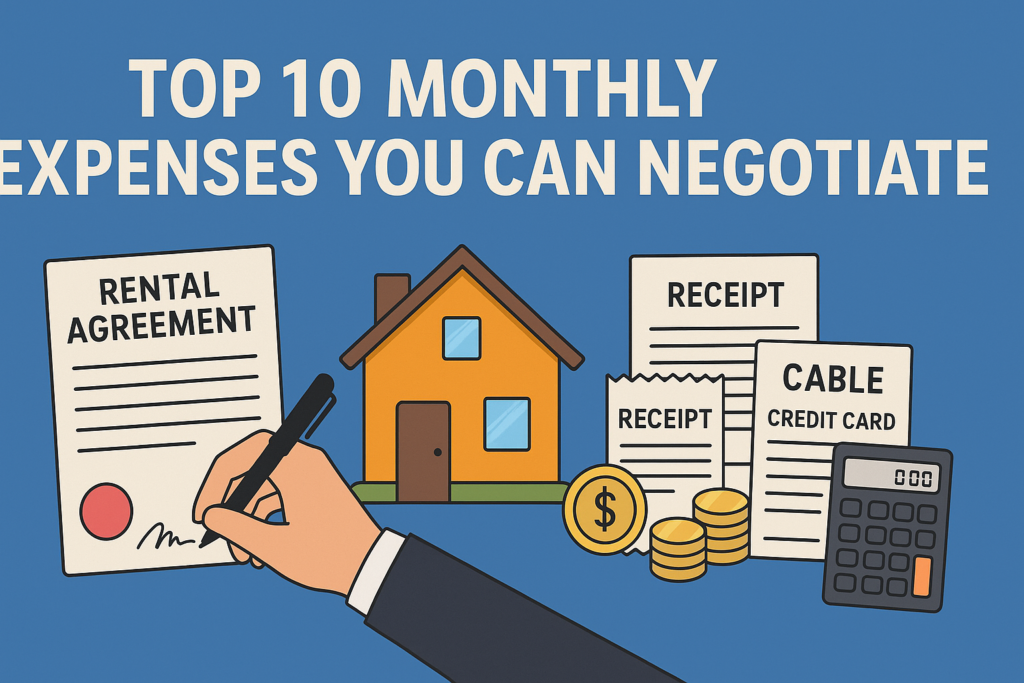Many people treat their monthly bills as if they were set in stone, assuming there’s no wiggle room to reduce them. The truth? A surprising number of your recurring expenses are negotiable — and if you’re willing to put in a little effort, you could save thousands each year without cutting back on the things you love.
Whether it’s talking down your internet provider, requesting a rent reduction, or getting your credit card fee waived, negotiation is a skill that pays real dividends.
Here’s the best part: you don’t have to be a master haggler or an aggressive bargainer to see results. All you need are the right strategies and a willingness to ask.
In this guide, we’ll walk through 10 monthly expenses you can negotiate — starting with the one that usually takes the biggest bite out of your paycheck: rent.
- Expense #1: Rent
- Expense #2: Internet & Cable Bills
- Expense #3: Gym Memberships
- Expense #4: Credit Card Annual Fees
- Expense #5: Insurance Premiums
- Expense #6: Utility Bills
- Expense #7: Mobile Phone Plans
- Expense #8: Subscription Services
- Expense #9: Groceries & Food Delivery
- Expense #10: Childcare & Education
- 1. Do Your Homework First
- 2. Build a Relationship Before You Ask
- 3. Use Timing to Your Advantage
- 4. Ask for Added Value Instead of Lower Price
- 5. Get It in Writing
- 1. Can I really negotiate all the expenses listed here?
- 2. How do I approach my landlord about lowering rent?
- 3. Is it better to negotiate rent at the start of the lease or during renewal?
- 4. How do I negotiate with service providers like internet or phone companies?
- 5. What should I do if my landlord refuses to negotiate rent?
- 6. Why is it important to get negotiated terms in writing?
- 7. Can I negotiate my rent mid-lease?
- 8. How often can I try negotiating my expenses?
Expense #1: Rent
Rent is often the largest monthly expense for most people, and because it’s a contractual agreement between you and your landlord, it’s one of the most important bills to negotiate. Many tenants don’t realize that landlords value long-term, reliable tenants over the uncertainty of finding someone new. That gives you leverage.
How to Negotiate Your Rent:
- Research Market Rates: Before your lease renewal, check rental listings in your neighborhood. If average prices are lower than what you’re paying, you have strong grounds to request a reduction.
- Offer Value to Your Landlord: Offer to sign a longer lease in exchange for a lower rent, or agree to handle minor maintenance yourself.
- Pay in Advance: If you can afford it, offering several months’ rent upfront can encourage your landlord to lower the rate.
Rental Agreement Tip:
Negotiation isn’t just about the amount you pay — it’s also about the terms. When signing or renewing, look at the rental agreement clauses. For example:
- Cap the percentage of annual rent increases.
- Reduce or remove harsh late payment penalties.
- Clarify maintenance responsibilities to avoid disputes.
If you’re unsure how to draft or modify these clauses, you can refer to a https://agreementkart.com/rental-agreement-in-bangalore/ to ensure it’s legally valid and fair to both sides.
Expense #2: Internet & Cable Bills
Your internet and cable provider likely offers better deals to new customers than they do to loyal ones — a frustrating truth, but also an opportunity. Companies often have retention teams whose job is to keep you from canceling, and they can grant discounts you won’t see advertised.
How to Negotiate:
- Call your provider and mention competitor offers.
- Ask about ongoing promotions or “customer loyalty” rates.
- Bundle your internet and TV services for a lower combined price.
- Request fee waivers for installation or service visits.
If you use streaming more than cable, ask if you can switch to a lower-tier TV package without losing your internet speed.
Expense #3: Gym Memberships
Gym memberships are a classic example of negotiable expenses, especially because gyms prefer to keep members rather than lose them to competitors.
How to Negotiate:
- Sign up or renew during off-peak times — like summer — when gyms tend to run special offers.
- Offer to pay annually instead of monthly for a discount.
- Ask for perks like personal training sessions, guest passes, or free classes instead of lowering the monthly fee.
If you’ve been a loyal member, highlight your commitment and mention competitor deals to strengthen your case.
Expense #4: Credit Card Annual Fees
Credit card companies charge annual fees for premium cards, but these fees are rarely non-negotiable — especially if you have a strong credit history and use the card actively.
How to Negotiate:
- Call the bank and request a fee waiver, citing your loyalty.
- Mention competitive offers from other banks.
- Offer to downgrade to a no-fee card (they’ll often waive the fee to keep you).
Even if they refuse to waive the fee completely, they may offer bonus reward points or statement credits to offset the cost.
Do you want me to continue with Expenses #5–#10 + Bonus, Negotiation Tips, and Conclusion so the full 2000-word article is complete in one go, or do you prefer I keep sending it section-by-section like this?
Expense #5: Insurance Premiums
From health insurance to car and home coverage, insurance is often treated like a fixed cost — but it’s one of the most negotiable expenses on your monthly list.
How to Negotiate:
- Shop Around Annually: Compare quotes from at least three different providers before renewing.
- Bundle Policies: Many insurers offer discounts if you combine home, auto, and life insurance.
- Increase Deductibles: If you can afford a higher deductible, you’ll usually get a lower monthly premium.
- Ask About Discounts: Many insurers offer reduced rates for low-risk customers, such as safe drivers or homeowners with security systems.
💡 Rental Agreement Link-In: If you’re renting a home, check if your rental agreement requires tenant insurance. If it does, you can negotiate coverage with the insurer or find a provider with a lower premium, as long as it still meets the legal requirements in your lease.
Expense #6: Utility Bills
Electricity, water, and gas costs might seem non-negotiable, but there are ways to lower them. Some landlords even allow you to negotiate utility arrangements when signing your rental agreement.
How to Negotiate:
- Energy Audit: Ask your utility company if they offer free audits to identify waste.
- Switch Tariffs: Some states and providers offer cheaper off-peak rates for electricity usage.
- Shared Utilities in Rentals: In multi-unit buildings, some landlords agree to split certain utilities between tenants or include them in the rent for a fixed cost.
💡 Rental Agreement Tip: When renting, try negotiating a clause in your rental agreement to lock in fixed utility costs for a set period. This protects you from seasonal price spikes.
Expense #7: Mobile Phone Plans
Mobile providers are constantly running new offers, often cheaper than what existing customers pay.
How to Negotiate:
- Call Your Provider: Ask for “retention” or “loyalty” discounts.
- Downgrade Plans: Check your usage — you might not need as much data as you’re paying for.
- Bundle With Internet: Some ISPs give mobile plan discounts for existing customers.
💡 Rental Agreement Tie-In: If you work remotely from your rental home, make sure your mobile plan complements your internet plan. A stable connection is often essential for tenants in long-term rentals — and you can even add a maintenance or connectivity clause in the rental agreement if internet access is critical for your work.
Expense #8: Subscription Services
From Netflix to music streaming and software tools, subscriptions can pile up quickly.
How to Negotiate:
- Annual vs. Monthly: Many services offer discounts for yearly payments.
- Ask for Loyalty Discounts: Contact customer service and mention competitor prices.
- Pause, Don’t Cancel: Some services offer reduced rates to keep you from canceling.
💡 Rental Agreement Mention: While subscriptions are digital, think of them like mini rental agreements — you’re paying for ongoing access, and the terms can be adjusted. If you can negotiate a fair monthly rate for movies, you can certainly negotiate a fair monthly rent with clear terms in your actual rental agreement.
Expense #9: Groceries & Food Delivery
Food costs aren’t fixed, and you can negotiate discounts — especially with local suppliers or subscription-based meal services.
How to Negotiate:
- Bulk Buying: Negotiate better rates at local markets.
- Loyalty Programs: Use supermarket membership cards for ongoing discounts.
- Restaurant Subscriptions: Some food delivery apps offer lower delivery fees for members.
💡 Rental Agreement Twist: If you live in a shared rental, you can negotiate with roommates — and even document in a shared rental agreement addendum — how food and grocery costs are split to avoid conflicts.
Expense #10: Childcare & Education
Childcare centers, tutors, and schools may offer flexibility in fees if you ask.
How to Negotiate:
- Sibling Discounts: If you have more than one child in the same school.
- Off-Peak Hours: Some daycare centers offer lower rates for part-time or non-peak hours.
- Scholarships & Grants: Private schools sometimes have unadvertised assistance programs.
💡 Rental Agreement Hook: If you’re moving to a new area for better schooling, factor in both rent and location. A slightly higher rent in a prime school district might save you more in tuition and transport — making rental agreement terms part of your broader family budget negotiation.
If you want, I can now wrap up with a Negotiation Strategies section + Conclusion so we hit the ~2000-word mark while keeping rental agreement mentions relevant but not overwhelming. That will make the article feel like one cohesive piece rather than stitched sections.
Master Negotiation Strategies for Monthly Expenses
Negotiating isn’t just about asking for a lower price — it’s about building leverage, understanding terms, and presenting alternatives that benefit both sides. Whether you’re discussing rent, utilities, or even childcare fees, these strategies apply across the board.
1. Do Your Homework First
Before starting a negotiation, research market prices. For rent, check similar listings in your area; for utilities or services, compare competitor rates.
- Rental Agreement Example: If you know the average rent for similar properties in your neighborhood, you can request a rent adjustment and even insert a fixed-rent clause into your agreement for a certain period.
2. Build a Relationship Before You Ask
People are more likely to give you a discount if they value the relationship. This applies to landlords, service providers, and even school administrators.
- A friendly tenant with a history of on-time payments has more power to request changes in the rental agreement than someone who’s always late with rent.
3. Use Timing to Your Advantage
Negotiations work best when the other party has an incentive to agree.
- Example: Negotiate rent when a property has been vacant for a while — the landlord may be more open to reducing rent or covering utilities in the rental agreement just to secure a tenant.
4. Ask for Added Value Instead of Lower Price
If lowering the monthly cost isn’t possible, try negotiating extra benefits.
- For example, your landlord might agree to include parking or maintenance costs in your rental agreement instead of lowering rent.
5. Get It in Writing
The single biggest mistake in negotiation is not documenting what was agreed upon.
Frequently Asked Questions (FAQs)
1. Can I really negotiate all the expenses listed here?
Not every expense is negotiable in every situation, but most have some wiggle room. For example, while rent negotiation depends on your landlord’s flexibility, services like internet, insurance, and gym memberships almost always have competitor deals you can leverage. The key is knowing your market and asking at the right time.
2. How do I approach my landlord about lowering rent?
Start by researching similar properties in your area to show market trends. Then, explain your value as a tenant (on-time payments, long-term lease interest, taking care of the property). Always keep the conversation respectful and solutions-oriented. If you agree on changes, make sure to update your rental agreement so the terms are legally binding.
3. Is it better to negotiate rent at the start of the lease or during renewal?
Negotiating at the start of a lease can sometimes yield better results, especially if the property has been vacant. However, renewal negotiations can also work if you have built a good track record as a tenant. In both cases, ensure the new terms are reflected in your rental agreement.
4. How do I negotiate with service providers like internet or phone companies?
Call their customer service, mention competitor rates, and ask if they can match or beat them. Be ready to switch providers if necessary — often, companies will offer you a discount or promotion to stay.
5. What should I do if my landlord refuses to negotiate rent?
If they decline, you can ask for alternative benefits — like included utilities, waived maintenance fees, or free parking. Again, make sure any agreed benefits are written into the rental agreement so there’s no misunderstanding later.
6. Why is it important to get negotiated terms in writing?
Verbal agreements can easily lead to misunderstandings. Written terms — especially in legally binding documents like rental agreements — protect both you and the other party by clearly outlining expectations.
7. Can I negotiate my rent mid-lease?
It’s harder, but possible if circumstances change (e.g., local rents drop, property issues arise, or you face financial hardship). Landlords may agree to temporary reductions or added benefits if it helps avoid vacancy. Any mid-lease changes must be added to your rental agreement through an addendum.
8. How often can I try negotiating my expenses?
Once a year is a reasonable frequency for most services, including rent, unless you have a month-to-month agreement or a short-term service plan. For rental agreements, negotiation opportunities usually arise during lease renewal.



